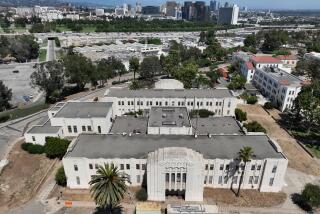Would Sale of O.C. Register Silence Libertarian Voice?
Early next month, descendants of R.C. Hoiles--the one-time newspaper publisher and a standard-bearer for libertarianism--will gather for what could become a watershed moment for Orange County’s famously conservative character.
On the agenda: The possible sale of Freedom Communications, the privately held company through which Hoiles’ descendants run the Orange County Register, 27 smaller daily newspapers, 37 weeklies and eight television stations.
At issue is a desire by some of Hoiles’ descendants--led by grandson and Freedom board member Tim Hoiles--to earn more income from their holdings. Options to be discussed at the Aug. 10-11 meeting include leaving things as they are, arranging a partial buyout of the cash-hungry heirs and selling the company, which is estimated to be worth up to $2 billion.
Such a sale would end nearly 70 years of Hoiles family ownership of the Register, just two years after the heirs of Harry Chandler made a similar decision and sold Times-Mirror Co.--publisher of the Los Angeles Times--to the Chicago-based Tribune Co.
There’s more at stake, though, than the possibility of another family-owned newspaper being gobbled up by a chain.
For decades, political and academic observers say, the Register has represented the philosophical heart of its core readership, a symbiotic relationship that has not only brought riches to Hoiles and his descendants, but helped shape the course of national politics.
As the Chandlers used The Times to push a business and development agenda in the early years of Los Angeles, Hoiles used his paper to spread his brand of libertarianism.
He positioned the Register as a bulletin board and bully pulpit for libertarian and conservative causes, helping launch grass-roots political efforts in the 1950s and 1960s that fueled the presidential bids of Barry Goldwater and Ronald Reagan.
“I don’t think you can underestimate their role in helping shape the political culture of the region,” said Lisa McGirr, a Harvard history professor who has studied the rise of conservative politics in Orange County. “The Register really helped introduce many people to conservative politics and ideas. It helped shape a relatively unformed dissatisfaction with American liberalism into a right-wing ideology.”
The paper has evolved in the years since Hoiles’ death in 1970, and the news pages no longer sound the libertarian or conservative clarion call. The editorial pages, though, remain staunchly libertarian. “We believe in a very consistent point of view, that we would always do our best to foster discussions about what it would mean to be free,” publisher Chris Anderson said Monday. “So we’re not very popular in some of the views that we would take. People would see them as rather liberal.”
He cited the paper’s support for decriminalization of drugs and prostitution, for ending the U.S.-led trade embargo of Cuba, and its recent criticism of the detention of hundreds of foreign-born U.S. residents in the aftermath of the Sept. 11 terror attacks.
The company even has a staff philosopher: Tibor Machan, a noted Hoover Institution research fellow and business ethics professor at Chapman University, advises the chain on public policy issues.
Whether the Freedom chain’s editorial viewpoint would stay libertarian under new ownership is a matter of debate. Anderson declined to speculate, but outside experts say newspaper chains in recent years have often left local editorial voices intact when they take over. Gone are the days of newspaper barons like Pulitzer and Hearst, who insisted on a uniform message.
“Typically, most chains allow the local unit a great deal of autonomy,” said Dave Demers, author of “The Menace of the Corporate Newspaper: Fact or Fiction” and a professor at Washington State University. “They know their operations are different and the local politics vary, so they will allow the local publisher and editor to set that general framework for editorial policy.”
Tony Fellow, who teaches American media history at Cal State Fullerton and USC’s Annenberg School of Communications, agreed. “I think the bottom line for any newspaper is to make money through ad revenues and enlarging circulation,” he said. “People still want that hometown newspaper that reflects the community. It behooves the new owners to continue the newspaper’s [viewpoint.]”
Yet the community the Register serves has been evolving rapidly. Where the area was once dominated by farmers and transplanted engineers from the Midwest, fresh waves of immigration have made the county increasingly diverse both ethnically and politically.
Despite increases in numbers of Democrats over the years, Republicans dominate the county’s electoral life, and they are in turn heavily drawn from the conservative wing of the party.
“Orange County is so unique and the Register, for all its ups and downs, has matched that uniqueness,” said Lois Lundberg, chairwoman of the Orange County Republican Central Committee from 1976 to 1985. “I would hate to see it become a standard thing that could be from any city. I would hope that they do not sell it. I consider it a valuable service to the Republican Party and politics.”
The Register’s political character reflects the thinking of Hoiles, who passed his philosophy on to his sons and successors as publisher, Clarence and Harry Hoiles, both deceased. The current generation of owners now numbers more than 80.
Hoiles, born in 1878 in Alliance, Ohio, studied engineering in college but quickly entered the newspaper business through his brother, Frank, who owned the daily Alliance Review. Eventually, the brothers became partners but fell out over politics, according to a history published on Freedom’s Web site.
Hoiles published several small Ohio newspapers until 1932. He then left the business for three years, devoting himself to reading political and philosophical tracts by Ayn Rand, John Locke and Henry David Thoreau, among others.
By the time Hoiles got back into newspapers by buying the Santa Ana Register in 1935, his view of the world was anchored in the libertarian perspective, where the concept of personal freedom trumped all.
Education was not the government’s business, according to this philosophy. Private initiative was good and unfettered free markets were part of the natural order of things. Communism was evil and Franklin Delano Roosevelt and his liberal descendants were a danger to America.
Hoiles’ philosophy became his paper’s philosophy, and together they emerged as the flagship for libertarianism and Western-style conservatism, building a like-minded electorate through proselytizing and exposing readers to heavy doses of conservative viewpoints.
“Hoiles was an extreme maverick,” said McGirr, author of “Suburban Warriors: The Origins of the New American Right.” In the 1950s and 1960s, “what the paper did was serve as a community bulletin board for conservative networking and conservative ideas ... and letting people know what was going on.”
Key, she said, was the “Clearinghouse,” a regular page of submissions from readers and politicos in which the conservative issues of the day were argued, and movements organized.
The Register was one of the few American newspapers to oppose the federal government’s internment of Japanese Americans during World War II. Such a move, Hoiles argued, fell outside government’s authority.
In the Cold War years, Hoiles’ paper was one of the few places where the John Birch Society--generally dismissed as part of the political fringe--was granted space to promote its viewpoint.
Frank Barbaro, president of the Orange County Democratic Party, grew up in Garden Grove during that era, and remembers the Register as the cement in the local conservative culture.
Barbaro’s family moved to Orange County in 1954, and Barbaro--then a conservative--recalled a political atmosphere of rabid anti-communism fueled in part by the Register. One of his high school teachers, he said, was dismissed for assigning students to read Karl Marx’s “A Communist Manifesto” along with Goldwater’s “The Conscience of a Conservative.”
“In those days, Orange County was the ultimate ‘conscience of the conservative,’ ” he said. “We were Goldwater.”
Barbaro’s politics shifted to the moderate center when he attended college in the 1960s--he calls himself a “Truman Democrat”--but he believes the Register is still important to local conservatives’ self-identity.
“I think the Register [editorial page] is the embodiment of the ultra-right wing, knee-jerk fundamentalist Republican,” Barbaro said.
Politics aside, the Register has been a successful business. It is the dominant journalistic voice in Orange County, with a daily circulation of about 320,000, fourth largest in the state.
A big change came to the Register in the mid-1970s, after Hoiles’ death, when the news pages began embracing the more detached approach of mainstream journalism, said Fred Smoller, a political science professor at Chapman University.
The change had its rewards: Since 1985 the paper has won three Pulitzer Prizes.
“Someone decided that this thing should be a serious newspaper,” Smoller said. “The news section really over the last 15 years has often been at odds with the editorial pages.”
More to Read
Sign up for Essential California
The most important California stories and recommendations in your inbox every morning.
You may occasionally receive promotional content from the Los Angeles Times.











